Springtime Hazards for Dogs - Slideshow

Dangers to Dogs This Springtime
Spring is truly a wonderful time. New plants bloom, the weather warms up, and people and dogs start getting outside more. It's important to know about the new hazards that springtime might bring for your canine pals, so that you can keep them safe and enjoy the season together.
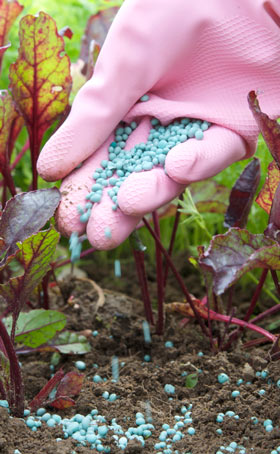
Snail & Slug Bait
Slug and snail baits used to kill garden pests often contain metaldehyde. This substance is toxic to dogs, and it can rapidly cause vomiting, panting, agitation, seizures, extremely high body temperatures, liver failure, and death. Make sure you read your product labels, and use pet-friendly slug control methods such as this one.
Rat Poison Toxicity
This type of poisoning is one of the most common toxicities to occur in dogs. Rat and mouse poison are widely used. There are four different main ingredients present in mouse and rat poisons, all toxic to dogs. One is a long-acting anti-coagulant that doesn't allow the body's blood to clot properly. Internal bleeding results in death over time. The second is cholecalciferol, which causes kidney failure and death. The third ingredient is bromethalin, which causes brain swelling. The last ingredient used in rat poisons is zinc phosphide. This poison reacts with stomach gases to make phosphine gas, which causes drooling, nausea, bloating, vomiting, shock, seizures, liver damage, lung damage, and death. The gas is also poisonous to humans if they are exposed to it because their dog vomits after ingesting it. Dogs can be poisoned by rat poison directly, or by eating a rodent that ingested it.
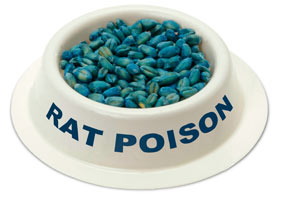
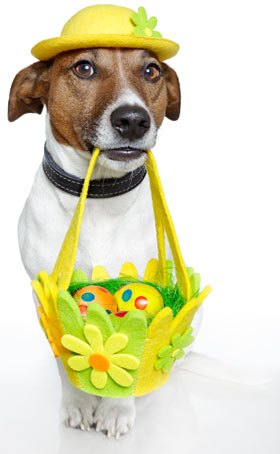
Easter Treats
Springtime brings Easter, a holiday that is traditionally celebrated with lots of treats. Dogs should be kept away from Easter goodies because many contain chocolate. Chocolate is toxic to dogs because of the theobromine and caffeine that it contains. Both stimulate the cardiac and nervous systems and can result in agitation, seizures, and death. Also, some treats contain xylitol, an artificial sweetener that causes a dangerous drop in blood sugar and, at high doses, liver failure.

Open Windows and Doors
Many of us like to air out our homes when the first fair winds of spring arrive. Take care that, by leaving windows and doors open, you don't inadvertently create escape routes (or falling hazards if it's an upper window) for your dog. Also, keep in mind that screens in upper-level windows may not hold if your dog jumps onto them, allowing him to fall through.
Car Rides
When warmer weather hits, we often like to take our dogs for more car rides. Safe rides for dogs mean no riding in the back of a truck (even a covered one), no hanging heads out of car windows, and using dog seatbelt harnesses. Allowing your dog to ride in the back of a truck can toss him around if you need to stop or turn suddenly, resulting in injury. If there is a car accident, your dog is very likely to be thrown out of the back of the truck. Dogs will often leap out of moving truck beds or windows when they see other animals or something interesting that they want to explore. Dogs in open truck beds and those hanging out of windows are also at risk of eye injury from bugs and other flying debris.
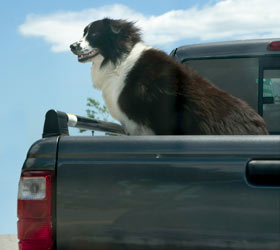
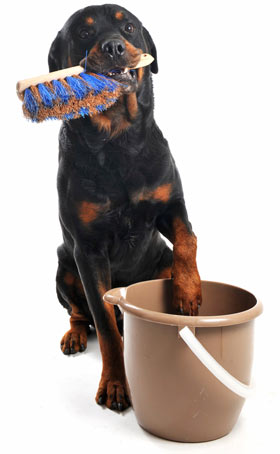
Cleaning Chemicals
Spring is a great time to sort, organize, and clean your home. Just be sure to take care while using your spring cleaning chemicals. Many cleaning chemicals are toxic to dogs when they are ingested or inhaled. Make sure that you allow lots of ventilation, keep the cleaning bottles out of reach of your dog, and don't allow him to be locked in a room that has recently been cleaned. Whenever possible, choose pet-safe cleaners, such as this one. Remember that pet-safe cleaners are usually safer for humans and the environment, too.
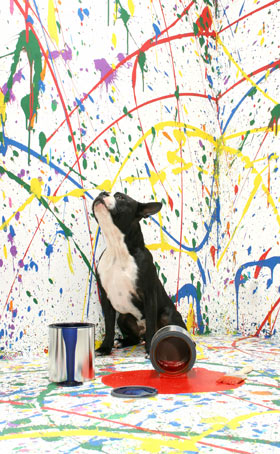
Home Improvement Supplies
Spring invariably brings home improvement projects. Roofing, siding, painting, repairing—all of these things are easier in warmer weather. Dogs love to help us with our projects; they want to be right underfoot. This can expose them to dangers such as stepping on or ingesting nails, being cut by sharp tools, or having something dropped on them. Make sure that your pooch is a safe distance from your project, and clean everything up thoroughly before you allow him access to the area again.
Fertilizers, Insecticides, and Pesticides
Spring is prime time for applying fertilizers, insecticides, and pesticides to your garden, lawn, and around your home. These products can all contain chemicals that are harmful to dogs. Read the labels carefully on anything that you are applying to areas that your dog has access to. Keep your dog away from places where these chemicals have been used. Better yet, use pet-safe products. When you are taking your dog for a walk outside of your own yard, he may get these substances on his paws, then lick it off of them. Washing your dog's paws and undercarriage with a wet washcloth or pet wipes when you get home from a walk is a good habit to develop all year round.
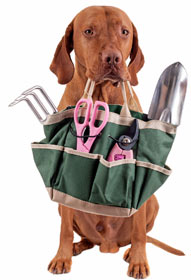
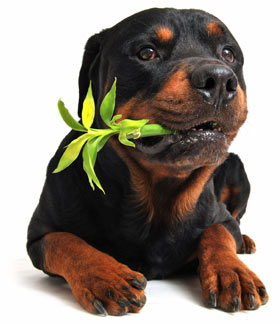
Poisonous Plants
Not only are plants blooming in the spring, but we are planting new ones too. Before you plant anything, make sure that it is not on the list of plants that are toxic to dogs. Also, take a look around your yard, especially if it is a new home, and make sure you can identify all of the plants that are present. Keep your dog on a leash when you are hiking or walking where he may find unknown plants to munch on.
Parasites
Springtime is great, but it does bring some pests that don't bother us as much in the wintertime. Ticks, mosquitos, fleas, and intestinal parasites all become more active in warmer weather (fleas and intestinal parasites can affect dogs all year, but there is an increase with warm weather). Ticks can carry potentially serious diseases such as Lyme disease, Rocky Mountain spotted fever, and ehrlichiosis. Mosquitos can carry heartworm disease. Intestinal parasites such as hookworm, whipworm, and roundworm are spread among dogs more easily in warm weather. Make sure your dog is on flea, tick, and heartworm preventative as spring arrives. Have a stool sample checked for intestinal parasites and a heartworm test done as often as is recommended by your veterinarian.
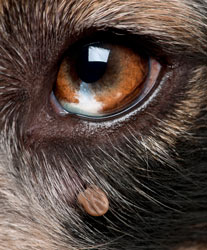
Getting Lost
Spring is a great time to double-check that your pet is as protected as possible in the event that he becomes lost. A microchip is an important part of this protection. A small chip that is implanted under your dog's skin can be scanned by veterinary offices and shelters if he is found. However, a microchip is not a transmitter. It only tells the scanner the microchip company and the dog's corresponding ID number. The vet or shelter can then call the company and give them your dog's ID number in order to get your phone number and contact you. You must keep your information current with the microchip company in order for a microchip to be beneficial. Whether or not your pet has a microchip, ID tags and collars are essential in providing information about you and your pet if he is lost because not all facilities have microchip scanners, and not all people who find dogs will take them to such places.

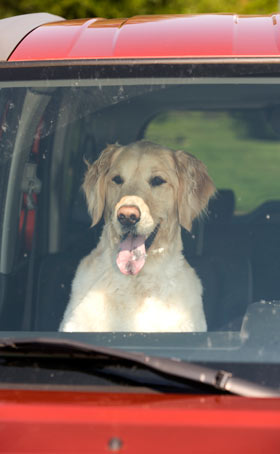
Heat Stroke
Remember that it's possible for your dog to become overheated as the weather warms up. Over-exertion in warm weather can cause heat stroke, seizures, and death in dogs. Brachycephalic dogs, those with short muzzles, are more prone to heat stroke, and it takes less heat and less exertion to cause it in those breeds. Remember that you should never leave your dog alone in a car in warm weather. Cracking windows in a parked car doesn't provide enough air flow to keep your dog safe. Trapping your dog in a hot car is terrifying and dangerous for him.
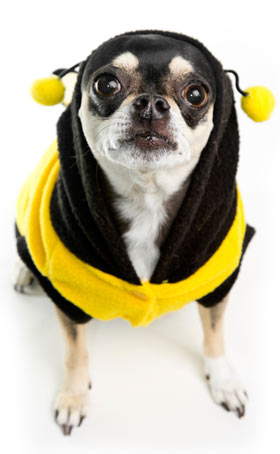
Insect Stings and Bites
People and dogs aren't the only creatures that begin to venture out in the springtime. Bees, spiders, and other biting insects are moving around, too, and curious dogs often get their muzzles, mouths, and other body parts stung or bitten. If you believe that your dog has been stung or bitten by an insect, watch him carefully for swelling of the muzzle, the tissue around the eyes, and the ears. Take your pet to the veterinarian immediately at the first signs of swelling because it may progress to trouble breathing, anaphylaxis, and death.
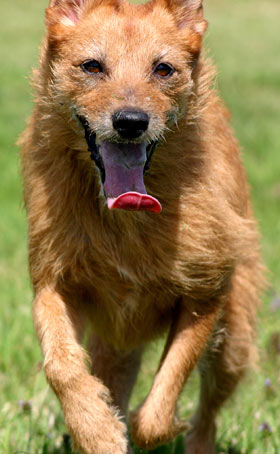
Exercise Injuries
If your dog hasn't been very active during the winter, make sure that you don't allow him to overdo it when he first starts running around outside in the spring. Keep the walks moderate and the games of fetch short until he can build up his muscle tone a bit. Dogs are prone to injuring muscles, tendons, and ligaments when they try to do strenuous exercise that their bodies aren't used to.

Stick-Chewing
It may seem like dogs are made to chew sticks, but it can be a dangerous pastime. Sticks can cause lacerations of the mouth tissues or throat if pieces are swallowed. It is very common for pieces of stick to become lodged between the back teeth, causing pain and trauma. Sticks are choking hazards, as well, and dogs can easily become impaled on them if they trip while carrying a stick and running.
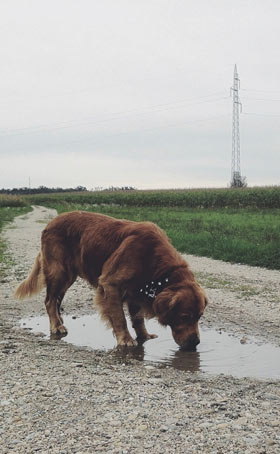
Puddles
Many of us love to watch those huge piles of snow melt away during the spring, but keep in mind that the puddles that the melt-off creates contain toxic substances such as road salt and antifreeze. Both of these substances are highly toxic to dogs. These are winter hazards that are often overlooked in the springtime. Don't allow your dog to drink from puddles.
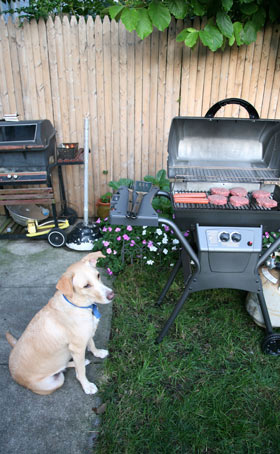
Parties and Barbecues
People and dogs both love springtime because there are often more chances to interact with others. Parties & barbecues are common occurrences as the weather warms up. Remember that there are human foods that aren't safe for dogs, and the other people present at the party may not be aware of them. Review these toxic foods for dogs, and keep a close eye on what your dog receives. Dogs also like to lick up grease that may drip from barbecue grills and will sometimes fill their stomachs with any rocks or sticks that the grease may have landed on.




